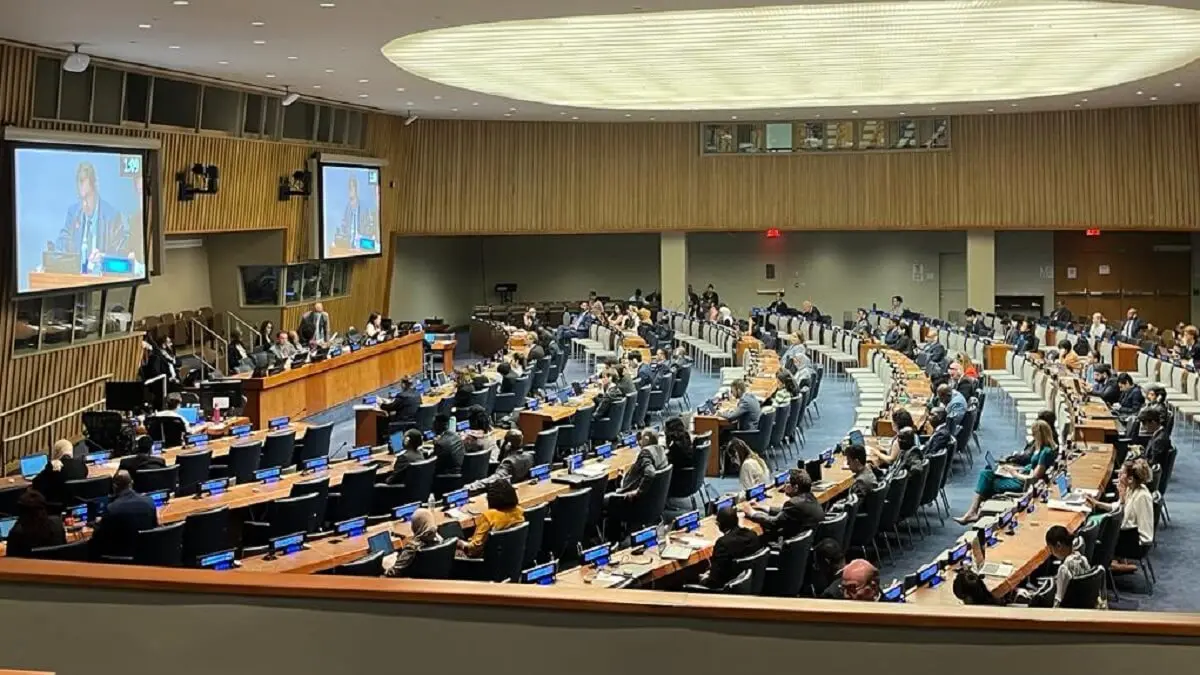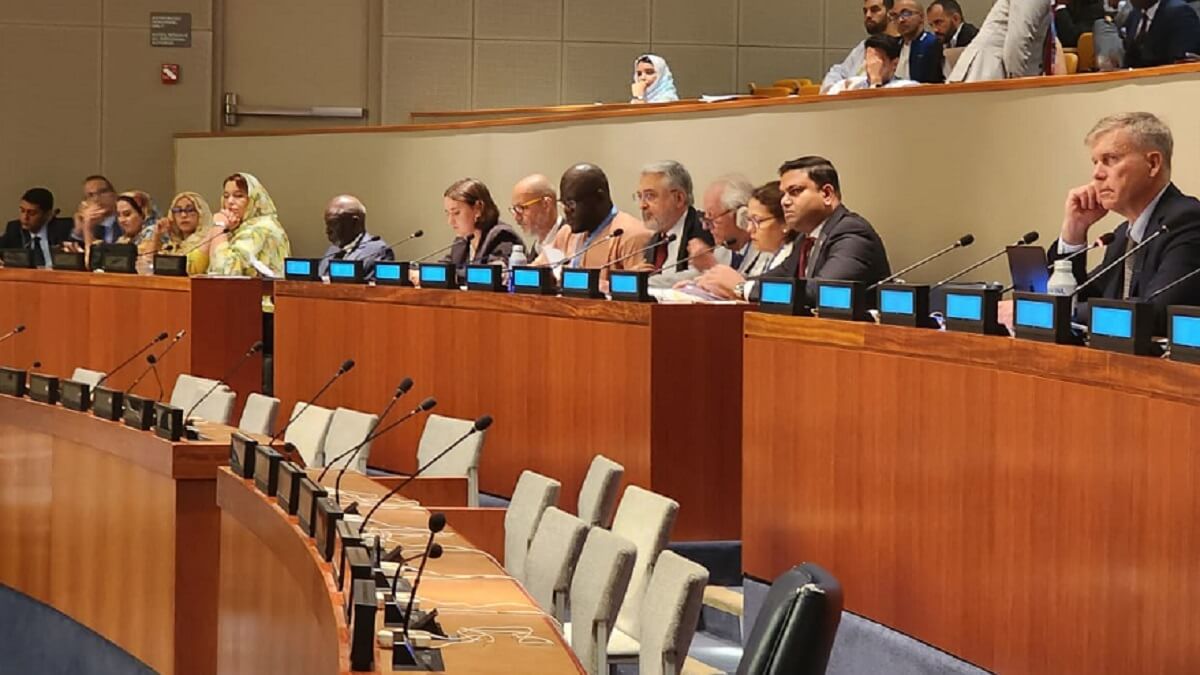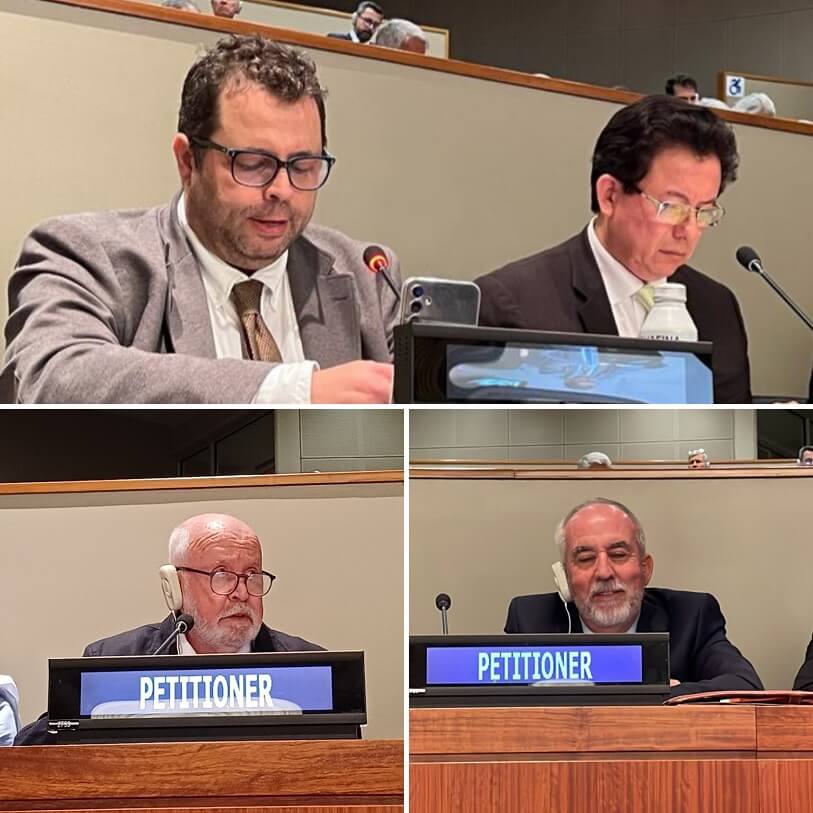4th UN Committee: Morocco's autonomy proposal from a global perspective

For the umpteenth year, the plenary sessions of the IV UN Commission (Decolonisation Committee), in the framework of the 78th session of the General Assembly, where the main event is usually the turn of the petitioners on the question of Western Sahara, have concluded. In a format of three-minute interventions by each petitioner, there were classic exchanges of views by the advocates of one position or the other.
In the case of the Polisario Front and its supporters, as was to be expected and is customary every year, their speeches were more militant and flamboyant, without much argumentation beyond the classic allusions to outdated resolutions of different organisations dating back to the last century, victimhood-ridden sophistry on the issue of human rights without any reliable source to corroborate it, as well as continuous and exacerbated disrespect for the host institution itself at its own headquarters, on the basis of an alleged inaction that favoured its interests.
On the other hand, most of the speakers from different continents who supported the Moroccan autonomy proposal were more academic and calm, with speeches based largely on objective and reliable facts or their own experiences on the ground, and always with the sole intention of collaborating in a realistic and immediate solution to a regrettable political and humanitarian situation that has been incomprehensibly prolonged for almost half a century, mainly due to the obstructionism of a few. In this regard, the following is a brief summary of some of the most relevant ones:
España pide a Argelia que registre a los “refugiados” de Tinduf
— Lahcen Haddad, PhD (@Lahcenhaddad) October 14, 2023
En #Nueva_York, con motivo de la celebración del 78º período de sesiones de la #Cuarta_Comisión_de_la_ONU, #España exige, en nombre de la #Unión_Europea, a #Argelia censar, identificar y registrar a los #saharauis y…
Abdul Latif Aidara, Director General of the Dakar-based African Centre for Strategic Intelligence (CISPaix), highlighted Algeria's hypocrisy when it calls itself a "mere observer" in relation to the conflict, stating that "Algeria is entirely responsible for its diplomatic, financial, logistical, etc. support for the Polisario".
He also criticised Algeria's refusal to participate in the political process leading to a solution to the dispute, thus opposing the Security Council resolution on the matter and contravening its responsibility as a state, asserting that "this country is one of the parties to the dispute, which it has used to implement its political agenda in the whole Sahel region. This is why this country must assume its responsibility and engage seriously in the roundtable process, as called for in resolution 2650".
On the other hand, the Mexican jurist Israel Herrera, Research Professor at the Legal Research Centre of the Autonomous University of Campeche, referred to the issue of child soldiers in Algerian territory governed by the Polisario, stating that "the use of children in a context of armed conflict constitutes a war crime under international humanitarian law, representing a serious violation of children's rights, and has been unanimously condemned by the international community". He concluded by recalling that protection must be a "tireless priority", urging all Member States to act in a determined and concerted manner to put an end to the recruitment and use of children by armed groups such as the Polisario Front.
Francisco Javier Giménez, director of the "Norberto Bobbio" School of Government and Public Policy in Paraguay, alluded to the humanitarian crisis in the Algerian camps, mentioning in his petition that "since 1975, an unspecified number of Moroccans - because the Algerian government and the Polisario have systematically refused to census them - have been living in subhuman conditions in the Tindouf camps, having known no other way of life for the last half century in one of the most inhospitable areas of the planet". Regarding the census and humanitarian aid, he pointed out that "the UN report warned of the serious humanitarian crisis in the camps, pointing to an alarming trend of malnutrition and cuts in food rations, mainly due to the systematic misappropriation of humanitarian aid carried out by the Polisario, with the participation of corrupt Algerian officials.
The former Peruvian Minister of Foreign Affairs and architect of the rupture of relations with the self-proclaimed SADR in 2022 when he was in office, Miguel Ángel Rodríguez Mackay, also took part, who, on the subject of international law and the UN resolutions raised by the Polisario, specified that "these resolutions, which are submitted for approval by the 193 states that make up the UN, are not binding, that is to say, they have no imperative or obligatory force, remaining only in their quality of recommendations".

According to the politician and jurist, "the question of the Moroccan Sahara is a geopolitical territorial issue instigated by the host country of the Tindouf camps in the context of the Cold War. SADR does not exist, neither legally nor in practice, it has no form of government, no population, no territory, nor is it recognised by more than 85% of UN member states", clearly alluding to the basic requirements to be recognised as a state under international law. He added that "SADR is nothing more than a branch of the Polisario whose creation was sponsored by Algeria in total violation of international law with the intention of undermining Morocco's territorial integrity".
Former Mexican diplomat and UNAM professor Andrés Ordoñez urged the UN, and by extension the international community, to carry out a "dispassionate analysis" of the dispute. According to the professor, in doing so, the dispute reveals its artificial character, since "it is not gratuitous that, at the request of the Kingdom of Morocco, this IV Commission included the Sahara issue on its agenda in 1963, a decade before the creation of the Polisario Front".
In general terms, any solution to this dispute other than political negotiation would be "regional suicide", just as a peaceful settlement would constitute a historic contribution to the economic and social well-being of the region. In short, it is a matter of carrying out a dispassionate exercise in historical reality and political realism for the benefit of international peace and security, in order to give unstinting support to the Moroccan autonomy initiative.
Peruvian journalist Ricardo Sánchez Serra, president of the Centro Federado de Periodistas de Lima, focused his criticism on the host state of the camps. On Algeria, the journalist added the necessary historical context by recalling that "it was this country that created the Polisario with the help of the Gaddafi regime in 1973, with geopolitical interests in the region, in order to undermine the culmination of Morocco's territorial integrity. Fifty years later, we are still facing this dispute, with tremendous violations of international humanitarian law in the Tindouf camps in Algeria".
He also recommended that Algeria "assume its responsibility and sit down in the round-table process to reach a definitive solution to the artificial conflict over the Moroccan Sahara, on the basis of the Autonomy Initiative, which the Security Council considers to be the most serious, credible and realistic basis". And finally he recalls that "the Saharawis already exercise their right to self-determination by participating in the democratic and electoral processes in Morocco".
There was also an abundant participation of natives of the territory in defence of the aforementioned Moroccan autonomy proposal, Saharawis such as Shaibata Mrabih Rabou, president of the Sahara Centre for Studies and Research on Development and Human Rights, who also denounced the question of the diversion of humanitarian aid, linking it directly to the absence of a strict and independent census to identify the refugee population properly, "a census which has never been carried out in almost half a century, in contravention of the Council's resolutions, as is the case with the latest one of October 2022". Like other petitioners, he also focused on the issue of child soldiers, stating that "the Polisario militia exploits children, through the culture of hatred and indoctrination".
He concluded by saying that "the Polisario has no democratic legitimacy to claim to represent the whole population, the majority of which is a peaceful people loyal to peace and to the ideals of Moroccan national integrity, as can be seen from the inhabitants of the southern provinces, who elect their representatives through democratic mechanisms of elections every six years, taking charge of local issues and participating in the economic and social development of the territory".
On the other hand, Limam Boussif, president of the Regional Youth Association of the Dakhla Oued Eddahab region, focused his intervention on the question of the economic development of the southern provinces, highlighting in his participation before the IV Commission the great development model launched in 2015, for which "ten billion dollars were allocated with the aim of achieving economic and social development for the benefit of the local population, financing more than 600 projects contributing to the creation of 120,000 jobs, reaching 81% completion in the first half of 2023". He also put special emphasis on the field of education, especially in the Dakhla region, explaining that "today, students can complete their postgraduate studies either through preparatory classes, the National School of Commerce and Administration, the Institute School of Nursing or the College of Technology".
He ended with a resounding statement based on two points: "The Sahrawi man was able to survive and two things helped us to overcome the difficulties we faced: the first factor is that we became a stable region thanks to the return to our homeland, Morocco. The second factor is development, whereby our region was built and transformed from a desert to cities that have all the necessities of life, and where the rule of law prevails.
On the environmental issue, sustainable development and energy transition, in direct relation to the Sahara dispute, several interventions stand out. The Mexican doctor of Moroccan origin, Amina El Mekaoui, technical officer of the National Council of Humanities, Sciences and Technologies (CONAHCYT), recalled that the Moroccan Sahara, rich in resources for the generation of renewable energies, 'represents a meeting point between sustainable development and the promotion of lasting peace. Regional stability is essential for global peace. The transition to clean energy sources and the growth of a diversified and sustainable economy in the region can serve as a beacon of inspiration for other African nations.
The close relationship between peace and sustainable development is undeniable, and he highlighted the immense renewable energy potential of the territory, especially in solar energy, which "can play a crucial role in the transition to clean energy sources and in the fight against climate change. However, for this potential to be fully realised, it is imperative that there is an environment of peace and stability," she said.
Ana Roios, a Portuguese jurist and political scientist and expert in EU environmental law, stressed that "Morocco's approach to the management of its resources is both ethical and sustainable, as well as contributing significantly to the development of the region, especially since 2015". She also added that these resources have the potential to bring prosperity not only to the local population, but also to the whole region. "The Kingdom of Morocco has demonstrated a strong commitment to the responsible management of these natural resources in the development of the region. Firstly, by investing in infrastructure, building and improving roads, airports and ports. And secondly in promoting renewable energy projects, which are especially important in light of the Paris Agreement and the upcoming EU Carbon Frontier Mechanism".

For the lawyer, Morocco's claim on this region and its approach towards the responsible use of natural resources deserves "an honest assessment taking into account the investments and developments in the region under Moroccan leadership through the autonomy plan".
Abdul Basit Syed, president of the British organisation World Humanitarian Drive, stated that "without peace there is no development and no implementation of the sustainable development goals". On the autonomy proposal, he invited all members of the international community to read this offer in detail "so that they can correctly identify the approaches formulated in it in favour of a lasting solution. The document presented by the Moroccan government stipulates a constant openness in terms of its implementation and possible impact".
On the other hand, he spoke of his relationship with the representatives of the tribes of southern Morocco, who "showed me clearly that what they call the Saharawi people are in reality Moroccans, and have considered themselves so for many centuries, having a long-standing direct relationship with the various dynasties that have ruled the country for centuries".
Finally, it is worth highlighting the participation of Fadel Breica, Saharawi activist and known in Spain for being one of the plaintiffs in the Audiencia Nacional against Brahim Ghali, for human rights violations against him. Breica called on the UN to put an end to the illegality and impunity in the camps. "We live under a military blockade imposed by the Polisario militia, which continues to commit many violations and crimes against innocent civilians. Extrajudicial killings and recruitment of children, in violation of the Geneva Conventions and the host country's obligations under international law," he said.
He also spoke of the continuing deterioration of the situation in the Algerian refugee camps, denouncing the Polisario leaders' harsh repression of Saharawis who criticise their long-standing corruption. "The host country's forces have so far failed to protect Saharawis under their jurisdiction, especially those who use social media as their (only) means of protest to denounce the Polisario's malpractices and lack of accountability, being abducted, disappeared and tortured in secret prisons for months".
On the Spanish side, the Canarian representation was particularly noteworthy, as in the case of Manuel Vidal, journalist and researcher at the University of Las Palmas, who recalled the need to make good use of opportunities, stressing that "opportunities are not expected, they are created. This is not only a solution to what many consider to be 'realpolitik', but the need to leave behind outdated approaches from the Cold War era, which have nothing to do with the reality experienced by the inhabitants of the Sahara, who are fully integrated into the varied and multicultural Moroccan society".
He also stressed that, during this time, Morocco has not stopped working to give strength and relevance to the autonomy initiative since the new constitution of the country in 2011. "Morocco has shown a real desire to integrate all its people, as we can see today in the former Spanish cities of Laayoune, Smara and Dakhla. This effort has not been reciprocated by the parties, who only propose a return to warlike confrontation".
Rafael Esparza, also a lecturer at the University of Las Palmas, stressed that "the claim that the Polisario is the legitimate representative of the people of the Sahara is a farce, designed to hide the numerous crimes committed against the captive population of the Tindouf camps over the last fifty years". In this regard, he recalled the importance of the emergence of the Movement Saharawi for Peace as a new and important interlocutor, stating that "it has broken the monolithism of the Polisario in a forceful way".
Polisario was not created until 1973, responding to Moroccan circumstances, changing its objectives under Gaddafi's interests and moving them under Algerian patronage. It is an armed militia structured on the Soviet model of a single party, with no room for dissenting voices, and which represses dissent", he concluded.
To conclude this summary of some of the most noteworthy speeches made in this IV Commission, we highlight an extract from the intervention of Ignacio Ortiz, president of the Fórum Canario Saharaui and political scientist. Among other issues, he emphasised the execrable and barely denounced issue of human rights violations in the Tindouf camps, which only focuses on one side and ignores the other, the one perpetrated in the camps, for sectarian and self-interested reasons. In this regard, he recalled that "Amnesty International noted on more than one occasion (2014, 2020) that 'the Tindouf refugee camps are opaque to scrutiny on this issue'. Human Rights Watch, on the other hand, noted that 'they received credible allegations of persecution of some dissidents by the authorities, and that civilian rights were infringed as they were tried in military courts'. All this with Algerian complicity'.
Some examples used in his intervention of these violations of fundamental rights in the camps by the Polisario Front are the constant repression of dissidents, the deprivation of liberty of women who participated in the "Holidays in peace" programme, or the immoral use of child soldiers. "However, the majority of Saharawis live in dignity in the Moroccan Sahara, enjoying a prosperous life, with work and social advancement", he concluded.
The plenary sessions of this IV UN Commission, related to this issue, are available on UN Web TV:
https://media.un.org/es/asset/k1w/k1wnsprqlc








